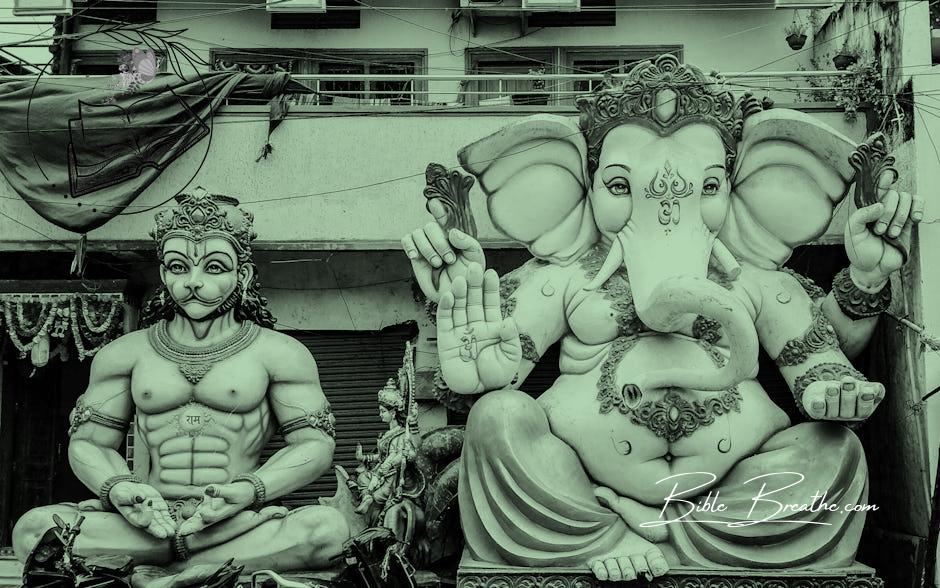Key Takeaways
- The Bible teaches that the soul is immortal and will continue to exist after the body dies (Matthew 10:28).
- The Bible does not give a clear answer on what exactly happens to the soul immediately after death, but it does provide some clues.
- According to the Bible, the soul will either go to a place of torment (Luke 16:23-24) or to a place of comfort and rest (Luke 23:43) after leaving the body.
- The Bible also teaches that the soul will be reunited with the body at the resurrection, when God will judge all people (1 Corinthians 15:52-53, Revelation 20:4-6).
- The concept of an intermediate state, where the soul exists separately from the body until the resurrection, is supported by passages like 2 Corinthians 5:8 and Philippians 1:23.
- The Bible does not support the idea of reincarnation or the transmigration of souls, as taught in some Eastern religions, but instead teaches that the soul will be judged by God after death and will either be saved or condemned (Hebrews 9:27, Ecclesiastes)
Introduction
What is the Soul, Anyway?
When we talk about the soul, we’re talking about the essence of who we are. It’s the part of us that makes us, us. But what happens to it when our bodies stop working?
The Concept of the Soul Leaving the Body
The idea of the soul leaving the body can be a bit mind-boggling. It’s like trying to wrap our heads around a mystery that’s hard to grasp. But the Bible has some answers for us.
The Role of the Bible in Explaining the Soul’s Journey
So, where does the Bible come in? Well, it’s our ultimate guide to understanding the soul’s journey. From Genesis to Revelation, the Bible gives us clues about what happens to our souls when we leave this earth. Let’s dive in and explore what it has to say!
The Soul’s Journey in the Bible

Photo modified by BibleBreathe.com. Original photo by Akshar Dave🌻 on Pexels
The Soul’s Creation in the Bible
Where did our souls come from?
The Bible tells us that God created our souls. In Genesis 2:7, it says, “And the Lord God formed man of the dust of the ground, and breathed into his nostrils the breath of life; and man became a living soul.” (KJV)
This verse shows us that our souls are a direct creation of God, and that He breathed life into us.
The Soul’s Purpose in Life
What’s the purpose of our souls?
The Bible says that our souls were created to worship and glorify God. In Isaiah 43:7, it says, “Even every one that is called by my name: for I have created him for my glory, I have formed him; yea, I have made him.” (KJV)
Our souls were made to have a relationship with God, and to bring glory to Him in everything we do.
The Soul’s Departure from the Body
What happens to our souls when we die?
The Bible tells us that when our bodies die, our souls go to be with the Lord. In 2 Corinthians 5:8, it says, “We are confident, I say, and willing rather to be absent from the body, and to be present with the Lord.” (KJV)
This verse shows us that when our bodies die, our souls will be with God, and that’s a comforting thought.
| **Soul’s Journey** | **Bible Verse** |
|---|---|
| Creation | Genesis 2:7 |
| Purpose | Isaiah 43:7 |
Where Does the Soul Go After Death?
The Concept of Heaven and Hell in the Bible
The Bible talks about heaven and hell, but what exactly are they?
Are they just abstract concepts or real places?
Let’s dive in and explore what the Bible says about these two destinations.
Heaven is often described as a place of eternal joy, peace, and harmony with God.
- It’s where believers will spend eternity with God, free from sin and suffering.
- The Bible describes heaven as a place with gates of pearl, streets of gold, and a river of life (Revelation 21:21, 22:1-2).
On the other hand, hell is a place of eternal suffering and separation from God.
- It’s where those who reject God’s love and salvation will spend eternity.
- The Bible describes hell as a place of fire and brimstone, where there will be weeping and gnashing of teeth (Matthew 13:42, Mark 9:43-44).
The Soul’s Destination After Death
So, what happens to our souls when we die?
Do they just disappear into thin air, or is there something more?
The Bible tells us that our souls are eternal, and they will continue to exist after our physical bodies die.
- Believers will go to be with the Lord, where they will receive their new, glorified bodies (2 Corinthians 5:8, Philippians 1:23).
- Unbelievers will go to a place of torment, where they will await judgment (Luke 16:23-24, Revelation 20:11-15).
The Soul’s Experience in the Afterlife
What will our souls experience in the afterlife?
Will it be a continuation of our lives on earth, or something entirely new?
The Bible gives us glimpses into what our souls will experience in heaven and hell.
- In heaven, our souls will experience joy, peace, and worship (Revelation 19:6-7, Psalm 16:11).
- In hell, our souls will experience suffering, torment, and regret (Luke 16:24, Matthew 25:41).
As the Bible says, “And as it is appointed unto men once to die, but after this the judgment” (Hebrews 9:27, KJV).
The Soul’s Transition: A Spiritual Perspective

Photo modified by BibleBreathe.com. Original photo by Marcus Aurelius on Pexels
The Soul’s Journey from the Physical to the Spiritual Realm
When our physical bodies cease to function, where does the soul go after it leaves the body?
The Bible gives us some insight into this mysterious process.
The soul’s journey is not a journey to nowhere; it’s a transition from one realm to another.
As the apostle Paul wrote, “to be absent from the body, and to be present with the Lord” (2 Corinthians 5:8, KJV).
This verse suggests that our souls continue to exist after our physical bodies die, and we enter into the presence of God.
The Soul’s Transformation After Leaving the Body
But what happens to our souls during this transition?
Do they remain the same, or do they undergo some kind of transformation?
The Bible teaches that our souls are immediately made perfect when we leave our earthly bodies behind.
As Hebrews 12:23 says, “to the general assembly and church of the firstborn, which are written in heaven, and to God the Judge of all, and to the spirits of just men made perfect” (KJV).
This verse implies that our souls are perfected, or made complete, when we enter into God’s presence.
The Soul’s Connection to the Divine
So, what does this mean for our understanding of the soul’s connection to the divine?
Our souls are eternal, and they continue to exist beyond our physical lives.
This eternal nature of our souls is what allows us to have a deep, personal connection with God, both in this life and the next.
As the prophet Isaiah wrote, “But now, O Lord, thou art our father; we are the clay, and thou our potter; and we all are the work of thy hand” (Isaiah 64:8, KJV).
This verse highlights the intimate, creative relationship between God and humanity, which is rooted in the eternal nature of our souls.
The Soul’s Destiny: A Theological Perspective
The Soul’s Ultimate Destination in Christian Theology
So, where does the soul go after it leaves the body?
This is a question that has puzzled people for centuries, and the Bible has some pretty clear answers.
According to Christian theology, when we die, our souls don’t just disappear into thin air.
They go somewhere, and that somewhere is determined by our relationship with God.
| Destination | Bible Verse |
|---|---|
| Heaven | “And Jesus said unto him, Verily I say unto thee, To day shalt thou be with me in paradise.” (Luke 23:43, KJV) |
The Soul’s Role in the Kingdom of God
But what happens to our souls when we get to heaven or hell?
Do we just sit around twiddling our thumbs, or is there something more?
In heaven, our souls will be actively engaged in worship and service to God.
We’ll be part of the grand choir, singing praises to our Creator.
We’ll be reunited with loved ones who have gone before us, and we’ll be able to learn and grow in ways we never thought possible.
The Soul’s Relationship with God
So, what’s the key to getting to heaven and avoiding hell?
It’s all about our relationship with God.
Do we know Him?
Do we trust Him?
Do we love Him?
For God so loved the world, that he gave his only begotten Son, that whosoever believeth in him should not perish, but have everlasting life.” (John 3:16, KJV)
The Soul’s Journey in Other Religions

Photo modified by BibleBreathe.com. Original photo by Sai varun N on Pexels
The Concept of the Soul in Other Religions
When we think about the soul, we often think about Christianity and the Bible.
But what about other religions?
Do they believe in the soul too?
Yes, many religions have their own concept of the soul or an afterlife.
Let’s take a look at a few examples:
- Hinduism: In Hinduism, the soul is called the “atman.” It’s believed to be eternal and reborn into a new body after death.
- Buddhism: Buddhism teaches that there is no permanent soul, but rather a stream of consciousness that continues after death.
- Islam: In Islam, the soul is believed to be created by Allah and will be judged after death.
The Soul’s Journey After Death in Other Religions
So, what happens to the soul after death in these religions?
- Hinduism: The soul is reborn into a new body, based on the karma from the previous life.
- Buddhism: The consciousness continues into a new existence, but the goal is to eventually achieve nirvana, or enlightenment, and break the cycle of rebirth.
- Islam: The soul is judged by Allah and either sent to paradise or hell.
Comparison of the Soul’s Journey in Different Religions
As we compare these different beliefs, we can see some similarities and differences.
One thing that stands out is the idea of judgment after death.
In Christianity, we believe that our souls will be judged by God and either sent to heaven or hell.
In Islam, there’s a similar idea of judgment by Allah.
But in Hinduism and Buddhism, the focus is more on the cycle of rebirth and the goal of achieving enlightenment or liberation.
And the soul that sinneth, it shall die. The son shall not bear the iniquity of the father, neither shall the father bear the iniquity of the son: the righteousness of the righteous shall be upon him, and the wickedness of the wicked shall be upon him.” (Ezekiel 18:20, KJV)
The Science of the Soul
The Soul’s Existence from a Scientific Perspective
When we talk about the soul, it’s easy to get caught up in the spiritual aspects.
But what about the science behind it?
Can we prove the soul’s existence?
Well, from a scientific perspective, it’s tough to pin down.
The soul is often seen as an intangible, non-physical part of us – which makes it hard to study or measure.
However, there are some interesting insights from the fields of psychology, neuroscience, and philosophy that can help us understand the soul better.
The Soul’s Relationship with the Body
So, how does the soul interact with our physical bodies?
Is it like a driver operating a car, or more like a conductor leading an orchestra?
The Bible gives us some clues:
“And the Lord God formed man of the dust of the ground, and breathed into his nostrils the breath of life; and man became a living soul.” (Genesis 2:7, KJV)
This verse suggests that the soul is what makes us alive, what gives us consciousness and awareness.
But what happens when our bodies die?
Where does the soul go?
The Soul’s Impact on the Physical World
The soul has a profound impact on our physical world.
It’s what drives our emotions, thoughts, and actions.
It’s what makes us create, love, and connect with others.
The soul is what makes us human, and it’s what sets us apart from the rest of creation.
So, when we talk about the soul, we’re talking about the very essence of who we are.
The Soul’s Journey in Near-Death Experiences

Photo modified by BibleBreathe.com. Original photo by Ketut Subiyanto on Pexels
The Soul’s Experience During Near-Death Experiences
Have you ever wondered where does the soul go after it leaves the body?
It’s a question that has puzzled people for centuries, and one that has sparked many debates.
While we can’t know for certain, near-death experiences (NDEs) offer some fascinating insights.
In NDEs, people often report feeling like they’re floating above their bodies, watching the scene unfold like a movie.
It’s as if their soul has left their physical body, giving them a unique perspective on the situation.
The Soul’s Perception of the Afterlife
So, what do people experience during NDEs?
Well, it’s not all harps and halos, but it’s not exactly fire and brimstone either.
Many people report feeling a sense of peace, love, and joy that’s hard to put into words.
Some see a tunnel or a bright light, while others encounter deceased loved ones or angelic beings.
| NDE Experience | Percentage of People Who Reported It |
|---|---|
| Feeling of peace | 60% |
| Seeing a tunnel | 40% |
| Meeting deceased loved ones | 30% |
The Soul’s Insights from Near-Death Experiences
So, what can we learn from NDEs?
For one, they suggest that our souls are more than just our physical bodies.
They also imply that there’s more to life than what we can see and touch.
As the Bible says, “For to be carnally minded is death; but to be spiritually minded is life and peace” (Romans 8:6, KJV).
“For we know that if our earthly house of this tabernacle were dissolved, we have a building of God, an house not made with hands, eternal in the heavens.” (2 Corinthians 5:1, KJV)
The Soul’s Journey in Literature and Art
The Soul’s Representation in Literature and Art
When we think about the soul, we often think about where does the soul go after it leaves the body Bible verse. But have you ever stopped to think about how the soul is represented in literature and art?
From Dante’s Inferno to Hagrid’s glowing soul in Harry Potter, the concept of the soul has been a recurring theme in many famous works.
It’s interesting to see how different authors and artists have chosen to depict the soul – as a glowing light, a ghostly figure, or even a physical entity that can be injured or harmed.
The Soul’s Journey in Famous Works of Literature and Art
Let’s take a look at a few examples:
- In John Bunyan’s Pilgrim’s Progress, the soul is represented as a pilgrim on a journey to the Celestial City, facing various challenges and obstacles along the way.
- In William Shakespeare’s Hamlet, the soul is depicted as a introspective and conflicted entity, grappling with the nature of existence and morality.
- In Walt Disney’s Coco, the soul is shown as a vibrant, colorful entity that continues to exist after death, influencing the lives of those still living.
The Soul’s Influence on Culture and Society
So, what can we learn from these representations of the soul?
For one, they show us that the concept of the soul has been a universal human concern across cultures and centuries.
They also remind us that the soul is not just a abstract concept, but a living, breathing entity that shapes our values, beliefs, and actions.
As C.S. Lewis once said, “You don’t have a soul. You are a soul. You have a body.”
“And the dust returns to the earth as it was: and the spirit returns unto God who gave it.” (Ecclesiastes 12:7, KJV)
Frequently Asked Questions About Where Does The Soul Go After It Leaves The Body Bible Verse
What is the meaning of the Bible verse?
The Bible doesn’t provide a direct answer, but scriptures like Ecclesiastes 12:7, 2 Corinthians 5:8, and Philippians 1:23 suggest the soul returns to God or goes to an intermediate state, awaiting judgment or resurrection.
Where does the soul go after it leaves the body
According to Christian beliefs, the soul goes to either heaven or hell, depending on one’s relationship with God, or to an intermediate state like purgatory in Catholicism, or to sleep until the resurrection in some Protestant views.
What are the different interpretations of the Bible verse ‘where does the soul go after it leaves the body’?
The Bible doesn’t provide a clear answer, leaving room for various interpretations. Some believe in an immediate judgment, while others think the soul sleeps until the resurrection. Catholicism teaches purgatory, while Protestantism often emphasizes heaven or hell. The Orthodox Church believes in an intermediate state. Additionally, some Christians believe in reincarnation or annihilationism.
How has the interpretation of the Bible verse ‘where does the soul go after it leaves the body’ changed over time?
The interpretation of the Bible verse has evolved significantly over time. In ancient times, the concept of an afterlife was not clearly defined, with souls believed to reside in Sheol, a dark, shadowy realm. Later, with the influence of Greek philosophy, the idea of an immortal soul emerged, and Christianity developed the concept of heaven and hell. Today, various Christian denominations and theologians offer diverse perspectives on the afterlife, ranging from literal interpretations to more symbolic and metaphorical understandings.
What happens to the soul after death?
According to various religious beliefs, the soul’s fate after death ranges from reincarnation to eternal life in heaven or hell. In Christianity, the soul goes to heaven or hell based on one’s actions during life. In Hinduism and Buddhism, the soul is reborn into a new life. Ultimately, the answer remains a mystery.
Does the soul go to heaven or hell?
According to Christian beliefs, when we die, our souls go to either heaven or hell, depending on our relationship with God. Heaven is for those who accept Jesus Christ as their savior, while hell is for those who reject Him. The Bible teaches that our souls will be judged based on our deeds and faith.
What is the relationship between the soul and God?
The relationship between the soul and God is one of connection and intimacy. The soul is seen as the deepest, most spiritual part of a person, and God is the creator and sustainer of the soul. In Christianity, the soul is believed to be made in God’s image, and its purpose is to love and serve God.
Matt Turner
I’m Matt, and I love breaking down Bible verses in a way that’s easy to understand and apply to everyday life. My goal is to help you connect with God’s Word and find practical ways to live it out. Whether you’re new to the Bible or just looking for some fresh insights, I’m here to walk with you and share what I’ve learned along the way.

